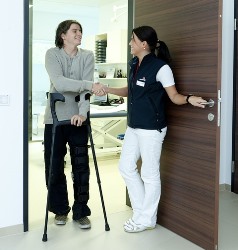How to Enroll In the Best LVN or LPN Training Program Near Columbia South Carolina
 Once you have chosen a rewarding career in the field of nursing, it's essential that you locate a Licensed Practical Nurse (LPN) program near Columbia SC that will provide the necessary training. If you live in Texas or California, then you will be searching for a Licensed Vocational Nurse (LVN) school instead. There is no difference, aside from the names, between an LPN and an LVN. They both undertake the same job functions and work in medical facilities under the supervision of Registered Nurses (RN) or Doctors. However their functions do vary depending on the state they practice in, which we will address in the next section. When starting their search for schools, many prospective nursing students begin with the ones that are the closest to their residences or that are the least expensive. Although tuition and location are significant factors, they are not the only qualifications that you should base your selection on. Other concerns, for instance if the schools are accredited or have high pass rates on the licensing exam are extremely important also. There are additional questions that you should ask prospective schools before enrolling in a LPN or LVN training program that we will address later in this article. But to start with, let's look at the function of an LPN and what is involved in the education and licensing process.
Once you have chosen a rewarding career in the field of nursing, it's essential that you locate a Licensed Practical Nurse (LPN) program near Columbia SC that will provide the necessary training. If you live in Texas or California, then you will be searching for a Licensed Vocational Nurse (LVN) school instead. There is no difference, aside from the names, between an LPN and an LVN. They both undertake the same job functions and work in medical facilities under the supervision of Registered Nurses (RN) or Doctors. However their functions do vary depending on the state they practice in, which we will address in the next section. When starting their search for schools, many prospective nursing students begin with the ones that are the closest to their residences or that are the least expensive. Although tuition and location are significant factors, they are not the only qualifications that you should base your selection on. Other concerns, for instance if the schools are accredited or have high pass rates on the licensing exam are extremely important also. There are additional questions that you should ask prospective schools before enrolling in a LPN or LVN training program that we will address later in this article. But to start with, let's look at the function of an LPN and what is involved in the education and licensing process.
It Only Takes a Few Minutes to Start Your LPN or LVN Career Below
What does an LPN or LVN Do?

Licensed Practical Nurses have many tasks that they perform in the Columbia SC healthcare facilities where they practice. As their titles signify, they are required to be licensed in all states, including South Carolina. While they may be responsible for managing Certified Nursing Assistants (CNA), they themselves generally work under the guidance of either an RN or a doctor. The health care facilities where they work are numerous and assorted, including hospitals, medical clinics, schools, and long-term care facilities. Anyplace that you can encounter patients in need of medical care is their dominion. Each state not only oversees their licensing, but also what duties an LPN can and can't perform. So depending on the state, their day-to-day work functions might include:
- Checking vital signs
- Providing medications
- Setting up IV drips
- Monitoring patients
- Taking blood or urine samples
- Maintaining patient records
- Supporting physicians or Registered nurses with procedures
In addition to their job functions being regulated by each state, the health facilities or other Columbia SC healthcare providers where LPNs work can further limit their job duties within those parameters. In addition, they can work in various specialties of nursing, for example long-term care, critical care, oncology and cardiology.
LVN and LPN Training
There are principally two academic credentials available that provide instruction to become an LPN or LVN near Columbia SC. The one that may be finished in the shortest time period, usually about 12 months, is the certificate or diploma program. The 2nd choice is to earn a Practical Nursing Associate Degree. These LPN programs are more comprehensive in nature than the diploma option and generally require 2 years to complete. The advantage of Associate Degrees, besides supplying a higher credential and more in-depth instruction, are that they furnish more transferable credit toward a Bachelor's Degree in nursing. Regardless of the kind of credential you pursue, it needs to be state approved and ideally accredited by the National League for Nursing Accrediting Commission (NLNAC) or any other national accrediting organization. The NLNAC warrants that the core curriculum effectively prepares students to become Practical Nurses, and that most graduates pass the 50 state required NCLEX-PN licensing exam.Attending LPN and LVN Online Courses
 Attending LPN schools online is emerging as a more in demand way to receive instruction and earn a nursing certificate or degree in Columbia SC. Some schools will require attendance on campus for part of the training, and nearly all programs call for a certain amount of clinical rotation hours completed in a local healthcare center. But since the remainder of the training can be accessed online, this method may be a more accommodating approach to finding the free time to attend college for many students. Concerning tuition, many online degree programs are less expensive than other on campus options. Even additional expenses such as for commuting and study materials may be reduced, helping to make education more easily affordable. And many online programs are accredited by U.S. Department of Education recognized organizations. Therefore if your job and household obligations have left you with limited time to work toward your academic goals, it could be that an online LPN school will make it more convenient to fit a degree into your active schedule.
Attending LPN schools online is emerging as a more in demand way to receive instruction and earn a nursing certificate or degree in Columbia SC. Some schools will require attendance on campus for part of the training, and nearly all programs call for a certain amount of clinical rotation hours completed in a local healthcare center. But since the remainder of the training can be accessed online, this method may be a more accommodating approach to finding the free time to attend college for many students. Concerning tuition, many online degree programs are less expensive than other on campus options. Even additional expenses such as for commuting and study materials may be reduced, helping to make education more easily affordable. And many online programs are accredited by U.S. Department of Education recognized organizations. Therefore if your job and household obligations have left you with limited time to work toward your academic goals, it could be that an online LPN school will make it more convenient to fit a degree into your active schedule.
Questions to Ask LPN and LVN Schools
Now that you have decided on obtaining your LPN certificate, and if you will attend classes on campus or on the web, you can utilize the following guidelines to begin narrowing down your options. As you undoubtedly are aware, there are many nursing schools and colleges near Columbia Sc as well as within South Carolina and throughout the United States. So it is essential to reduce the number of schools to choose from in order that you will have a workable list. As we already discussed, the site of the school as well as the expense of tuition are undoubtedly going to be the first two things that you will look at. But as we also emphasized, they should not be your only qualifiers. So prior to making your ultimate choice, use the following questions to evaluate how your selection compares to the other schools.
- Accreditation. It's a good idea to make sure that the certificate program in addition to the school are accredited by a U.S. Department of Education recognized accrediting organization. Aside from helping confirm that you get a quality education, it may help in acquiring financial aid or student loans, which are often not provided for non-accredited schools near Columbia South Carolina.
- Reputation. Check online rating services to see what the evaluations are for all of the LPN schools you are considering. Ask the accrediting organizations for their reviews too. Also, contact the South Carolina school licensing authority to check out if there are any complaints or compliance issues. Finally, you can contact some nearby Columbia SC healthcare organizations you're interested in working for after graduation and ask what their assessments are of the schools as well.
- Internship Programs. The most effective way to acquire experience as a Licensed Practical Nurse is to work in a clinical setting. Essentially all nursing degree programs require a specific number of clinical hours be completed. A number of states have minimum clinical hour mandates for licensing as well. Find out if the schools have a working relationship with nearby Columbia SC community hospitals, clinics or labs and help with the positioning of students in internships. Also, it's important that you choose a school that offers clinical training in the type of facility you are most interested in. For example, if you want training and experience in pediatric care, make sure that the school you choose provides adequate clinical rotation in an area Pediatric Hospital.
- Licensing Preparation. Licensing criteria for LPNs are different from state to state. In all states, a passing score is required on the National Council Licensure Examination (NCLEX-PN) along with graduation from an approved school. Certain states require a specified number of clinical hours be performed, as well as the passing of additional tests. It's imperative that the school you are attending not only delivers an exceptional education, but also readies you to comply with the minimum licensing requirements for South Carolina or the state where you will be working.
- Graduation and Job Placement Rates. Find out from the LPN schools you are looking at what their graduation rates are as well as how long on average it takes students to complete their programs. A low graduation rate may be an indication that students were unhappy with the program and dropped out. It's also imperative that the schools have high job placement rates. A high rate will not only substantiate that the school has a good reputation within the Columbia SC healthcare community, but that it also has the network of relationships to help students obtain employment.
- NCLEX Exam Pass Rate. Once you receive your certificate or diploma, you must sign up for and pass the National Council Licensure Examination for Practical Nurses (NCLEX-PN). Enrolling in a school with at least a 75% pass rate is highly preferred. Lower pass rates may indicate that a school’s program, curriculum or instructors are ineffective in teaching its students. You can find out from the school what their passing rate is for the last 5 years, or request the information from the State Board of Nursing.
Learn How to Become an LVN or LPN in Columbia
Pick the Best Columbia Licensed Vocational Nurse Training
Selecting the right Licensed Practical Nurse program is potentially the most crucial first step to starting a new career in the healthcare industry. There are numerous aspects that you should consider when choosing a nursing school. These factors will be prioritized differently contingent on your current career objectives, obligations, and financial situation. As we have stressed within this article, it is important that you enroll in an LPN school and a certificate or degree program that are both accredited and have outstanding reputations within the health care community. By utilizing our checklist of qualifying questions, you will be able to develop a shortlist of schools to pick from so that you can make your ultimate selection. And with the proper degree and training, combined with your hard work and drive to succeed, you can become an LPN in Columbia South Carolina.
